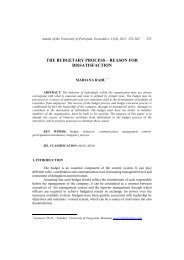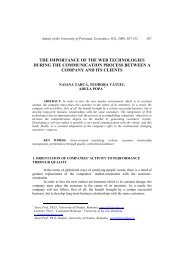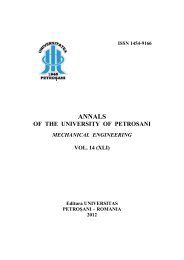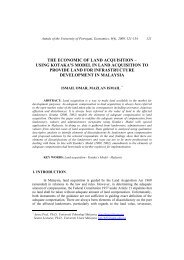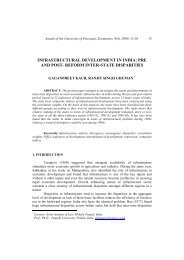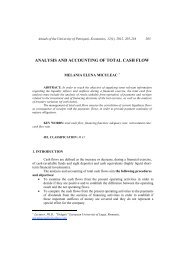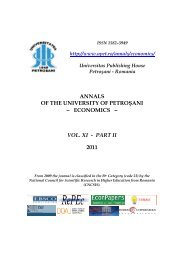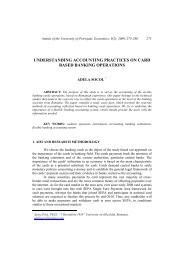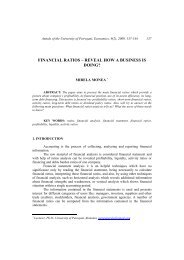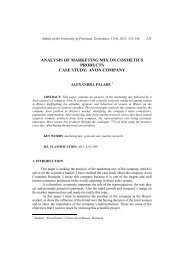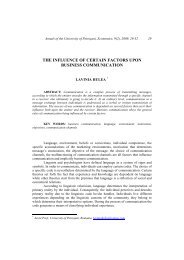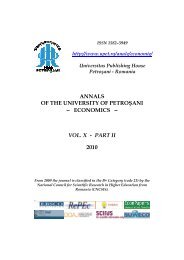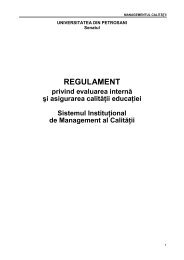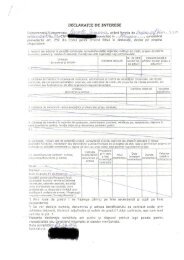annals of the university of petroÅani â¼ economics â¼ vol. xi - part i ...
annals of the university of petroÅani â¼ economics â¼ vol. xi - part i ...
annals of the university of petroÅani â¼ economics â¼ vol. xi - part i ...
Create successful ePaper yourself
Turn your PDF publications into a flip-book with our unique Google optimized e-Paper software.
122 Lesconi Frumuşanu, M.; Breuer, A.; Jurchescu, D.<br />
accounting e<strong>vol</strong>ved continuously, perfecting both its <strong>the</strong>oretical basis and research<br />
methods, ranging from simple to complex, from rudimentary <strong>the</strong> higher forms,<br />
establishing a clear terminology, its study subject and <strong>the</strong> economical and social<br />
usefulness.<br />
Bernard Colasse defines <strong>the</strong> term “accounting” using <strong>the</strong> following statement<br />
“accounting [...] is not an immutable technique, but an information system which has<br />
been constantly adapted to <strong>the</strong> informational needs <strong>of</strong> businesses and <strong>the</strong>ir<br />
environment” (Colasse, 1989). The same author mentions “Accounting is <strong>the</strong> oldest <strong>of</strong><br />
all sciences <strong>of</strong> management. It is <strong>the</strong> very history <strong>of</strong> accounting: accounting books were<br />
intended to keep after a number <strong>of</strong> events with economic consequences ...” (Colasse,<br />
1989)”.<br />
According to <strong>the</strong> Accounting Law no. 82/1991, accounting is an activity<br />
specialized in measuring, evaluating, knowing, managing and controlling <strong>of</strong> assets,<br />
liabilities and equity, as well as <strong>the</strong> results obtained from <strong>the</strong> work <strong>of</strong> individuals and<br />
businesses. It must provide chronological and systematic recording, processing,<br />
publication and maintenance <strong>of</strong> information on <strong>the</strong> financial position, financial<br />
performance and cash flows, both for <strong>the</strong>ir domestic needs and in dealing with present<br />
and potential investors, financial and commercial creditors, customers, public<br />
institutions and o<strong>the</strong>r users. Viewed in terms <strong>of</strong> information it uses and provides,<br />
accounting is seen as “a quantitative technique <strong>of</strong> collecting, processing and analysing<br />
<strong>the</strong> information on flows <strong>of</strong> a company's economic activity” (Group <strong>of</strong> authors <strong>of</strong> <strong>the</strong><br />
Economy and Economical Policies De<strong>part</strong>ment <strong>of</strong> <strong>the</strong> Economical Studies Academy<br />
from Bucharest, 1999).<br />
2. THE CONCEPT OF “PROJECT ACCOUNTING” IN LITERATURE<br />
In literature, <strong>the</strong>re are various terms which are found with reference to<br />
accounting: accounting, financial accounting, managerial accounting, accrual<br />
accounting, cash accounting, managerial accounting, project accounting, accounting<br />
through projects.<br />
Financial Accounting (general) is considered as <strong>the</strong> “external front” <strong>of</strong> a<br />
company and management accounting (internal, managerial, operational, analytical) is<br />
considered to be <strong>the</strong> “internal front” <strong>of</strong> a company.<br />
Financial accounting (in Anglo-Saxon terminology) provides chronological and<br />
systematic recording, processing, publication and preservation <strong>of</strong> information on <strong>the</strong><br />
financial position, financial performance and cash flows for both <strong>the</strong> internal relations<br />
as well as external ones; it is highly formalized, governed by laws and binding for all<br />
economic entities (Accounting Law no.82/1991).<br />
Financial accounting, also called general, is <strong>the</strong> one which obtains information on<br />
heritage management, which are essential for <strong>the</strong> decision-makers <strong>of</strong> an economic entity,<br />
and on financial performance needed by external users (exogenous), including <strong>the</strong> state.<br />
Michel Capron defines analytical accounting as “an essential management tool<br />
which provides information and helps in decision making. Unlike <strong>the</strong> general accounts,<br />
it does not respond to external social demands, it is not subject to codification



